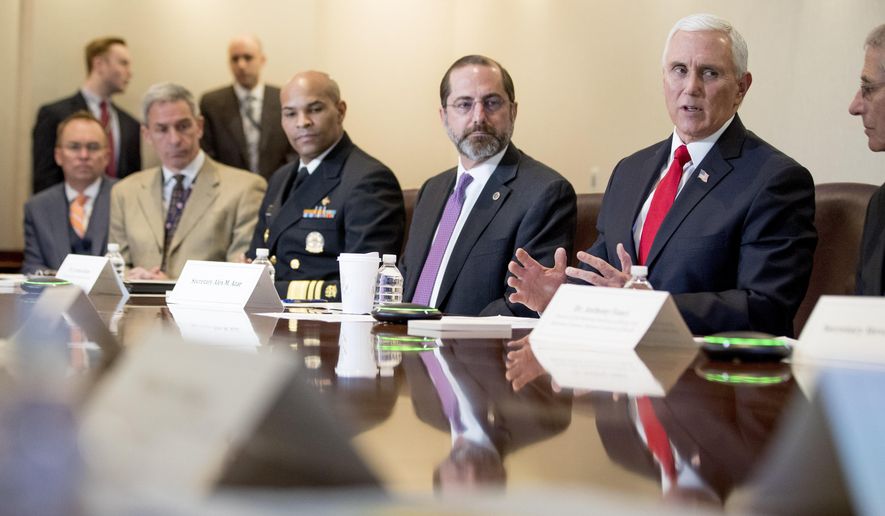The White House and Congress are in “productive” talks on a package to fund the coronavirus response and hope to strike an agreement by early next week, the administration said Friday.
“We know that the pace of conversation is accelerating into this weekend,” said Eric Ueland, the White House director for legislative affairs.
President Trump told Congress this week he wants to spend $2.5 billion to combat the virus, which has sickened more than 80,000 people across the globe.
Members of both parties say that number needs to be higher.
White House officials didn’t say where they thought negotiators would land, but Mr. Trump says he’s willing to accept more than his requested amount.
He wants to sign a deal not later than the week starting March 9, officials said.
SEE ALSO: What we know about the coronavirus
Mr. Ueland said he is pleased that Congress hasn’t tried to attach unrelated measures to the bill, saying it’s allowed negotiators to focus.
Washington is racing to fund the U.S. response to the virus that’s devastated parts of China, rattle markets and stressed economies and health systems in Italy, South Korea and Iran.
While younger, healthier people tend to recover from the illness known as COVID-19, it can lead to respiratory distress, organ failure and death, particularly in older persons or those with underlying health conditions.
The U.S. has seen 62 cases on its soil — 47 of them were repatriated from China and Japan, while 14 were discovered among known travelers or their spouses in America.
It’s unclear how a 15th patient, a woman hospitalized California, contracted the disease.
Mr. Azar said Mr. Trump’s request focuses on boosting the nation’s ability to detect COVID-19, developing a vaccine and therapeutic drugs, providing protective gear to frontline workers and supporting state and local government.
Mr. Azar said the administration is prepared to use the Defense Production Act to make sure companies turn out things like N95 respirator masks and protective gowns.
“If we need to use it, we will use it,” Mr. Azar said.
As nations like Japan close schools to deal with the virus, Mr. Azar said any contingencies in the U.S. will be on a continuum, starting with less intrusive measures to keep people apart before more intensive measures are taken.
“Every option needs to be on the table,” Mr. Azar said, responding to a question about potential school closures. “It depends really on what circumstances we end up facing.”
On funding, White House officials balked at the idea that Mr. Trump’s request for $2.5 billion lowballed the price tag of the response. They focused on the rest of the fiscal year through September instead of an open-ended, or “no-year,” request like Democratic Sen. Charles E. Schumer’s push for $8.5 billion.
Russ Vought, acting director of the Office of Management and Budget, also said he wanted to clear up misconceptions about Mr. Trump’s budget moves in office, saying the media has gotten it wrong.
He said Mr. Trump’s fiscal 2021 budget includes a 3% increase for the Centers for Disease Control and Prevention to combat infectious diseases.
The CDC faces an overall reduction due to cuts to things like climate-change research or occupational health research that universities are doing instead, according to Mr. Vought.
“It is not true that we cut CDC infectious-disease fighting,” he said.
He said additional funding from Congress will be vital, but the administration isn’t running on fumes.
“We need a supplemental, we need it soon, there’s no doubt about that,” Mr. Vought said. “But we haven’t run out of money.”
Also Friday, Mr. Azar said his agency is “fully investigating” a whistleblower complaint that says HHS employees didn’t take proper precautions in dealing with repatriated Americans who flew into a California military base from places in Asia battered by the coronavirus.
“We will take remedial measures if needed,” Mr. Azar said.
He said the Office for Children and Families, which was alleged to have broken protocol, will no longer be involved in the coronavirus response since the U.S. does not plan to conduct more repatriation flights.
• Tom Howell Jr. can be reached at thowell@washingtontimes.com.




Please read our comment policy before commenting.